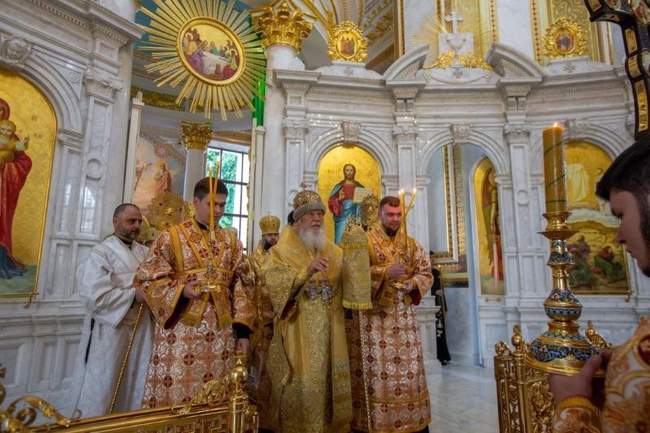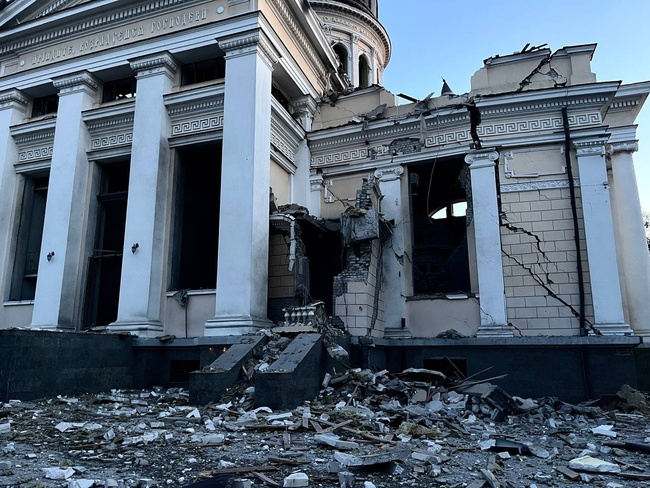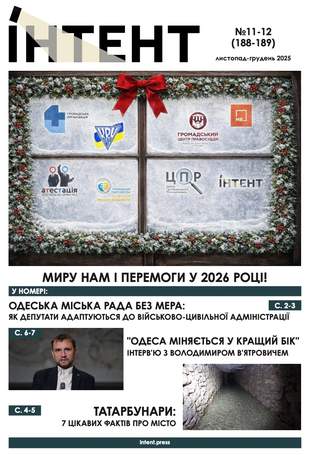Меню
Соціальні мережі
Розділи
Jan. 26, 2024, 10:58 p.m.
Gold of the church: how Odesa politicians supported the Church of the Moscow Patriarchate from the public budget
This article also available in English318

Photo: Odesa Eparchy of UOC (MP)
Churches in Ukraine are quite profitable businesses. It is no secret that clergymen charge parishioners for their services, having established a fee for baptisms, weddings, and funerals. Churches don’t even try to disguise it somehow. But this is not the only income source for the clergy.
Odesa region was "occupied" by the Ukrainian Orthodox Church (UOC) of the Moscow Patriarchate. Moreover, as the Centre of Public Investigations previously wrote, some Odesa clergymen openly played along with the aggressor country. Some have Russian citizenship, and some have moved to Russia to spread false Kremlin propaganda there.
However, these facts have not yet affected the overall situation. According to analytical data from the Opendatabot portal, there are currently 415 churches of the Moscow Patriarchate in our region. Since the beginning of the full-scale war, only two churches of the UOC – in Vyzyrka and Oleksandrivka – have transferred to the Orthodox Church of Ukraine (OCU). This is the country's lowest figure.
But this material by the Center of Public Investigations follows the money.
Public budget funds for construction
On 23 July 2023, the Transfiguration Cathedral in the heart of Odesa, on Soborna Square, was badly damaged during a massive missile attack by Russia. Neither its affiliation with the Moscow Patriarchate, the 14-tonne bell cast in Voronezh, Russia, nor its consecration in 2010 by Russian Patriarch Kirill saved the church. Kirill's visit was supposedly the incentive to finalise the restoration works of the cathedral. Italy has promised to help with the building repair. It is currently known that the first tranche of 500 thousand euros has been allocated.
 Transfiguration Cathedral after the Russian shelling. Photo: Odesa Eparchy of the UOC (MP)
Transfiguration Cathedral after the Russian shelling. Photo: Odesa Eparchy of the UOC (MP)
This is not the first major event in the Transfiguration Cathedral’s history. In 1999, in contemporary Ukraine, it was decided to restore the cathedral. The building had been blown up by the Bolsheviks during the Soviet era. Open sources indicate that the restoration work was carried out exclusively through charitable contributions, without the use of budgetary funds.
The cathedral was managed by the Black Sea Orthodox Foundation, headed by Vasyl Iyeremia, a former Odesa councillor. On 22 May 2010, "Vechirnia Odesa" published an article where Iyeremia stressed that not a single budgetary penny had been spent on the cathedral's restoration. He provided a report on the foundation's work: over ten years, they spent 30.4 million UAH on the works. This figure was not final, as the work was still ongoing at the time the report was published. Other sources indicate the sum of 35 million UAH. Iyeremia also said that the building's maintenance, including network support and utility bills, cost 1.1 million UAH as of 2009.
These payments for the maintenance of the Moscow Patriarchate Cathedral were imposed on Odesa taxpayers. But there’s more to this story. In 2006, the councillors of the Odesa City Council, incidentally, including Vasyl Iyeremia himself, voted in favour of a 2007-2008 programme for the Odesa Cathedral restoration. The adopted programme provides that as of 2006, all cathedral restoration works were carried out at the benefactor's expense, but the amount of contributions is shrinking: in 2004, donations amounted to 11.1 million UAH; in 2005 – 4.85 million, and for the first 9 months of 2006 – 2.36 million.
So, the Black Sea Orthodox Foundation decided to dip into taxpayers' pockets. Odesa councillors voted to allocate UAH 20.1 million from the budget for the cathedral restoration, which is now managed by the Ukrainian Orthodox Church of the Moscow Patriarchate. They planned two-stage funding: 15 million budgetary UAH in 2007 and another 5.1 million in 2008. This is comparable to $4.3 million at the then exchange rate.
In addition, a news article in the Holos Ukraine on 15 November 2002 reported on the tender announcement for the painting of icons and interior decoration of Odesa’s Transfiguration Cathedral. The tender was held by the Odesa City Council. Unfortunately, the amount of money allocated for this purpose is unknown.
We sent an enquiry to the Odesa City Council to explore financing the construction and decoration of the UOC Cathedral from the budget. The city's City Department of Capital Construction replied that the department had not received any funds for the cathedral's reconstruction under the 2007-2008 programme. At the same time, the City Department of Capital Construction transferred UAH 734,000 to the Black Sea Orthodox Foundation in 2004-2005. This is comparable to about 140 thousand dollars at the exchange rate of the time. The Department has no information on the financing of the cathedral's decoration.
In a comment to the Centre for Public Investigations, the head of the Black Sea Orthodox Foundation, Vasyl Iyeremia, once again assured that no budget funds for the cathedral reconstruction have been allocated. He does not remember the final amount spent on the cathedral's construction: "Not a single penny of budget money was raised for the cathedral's reconstruction. Maybe because they just wouldn’t give that money. The resolution of the Cabinet of Ministers, according to which the cathedral was reconstructed, provided for budgetary funding, but unfortunately, there was none. Nor did we get anything under the programme the city council voted for. I don't remember quite well. Probably, it was adopted, but there was no funding. The cathedral was reconstructed solely on donations from citizens and enterprises of the city... The Black Sea Orthodox Foundation did not receive a penny from this programme."
Once the construction was completed, the cathedral was handed over to the Odesa Eparchy of the Moscow Patriarchate. But for several years, it was maintained at the expense of the public budget.
"Assistance" for maintenance
In January 2023, Intent published the news that the Odesa police were checking the changes in the Transfiguration Cathedral’s ownership – from municipal to private – and its financing through public funds from 2012 to 2017.
This is not the first time the cathedral has been subjected to such inspections by law enforcement. The Orthodox Life portal has a news article from 2017, which presents the position of the Odesa Eparchy of the UOC (MP) on the Security Service of Ukraine (SBU) investigation into the financial assistance provided by local authorities to the Cathedral. The Eparchy also acknowledged that taxpayers have been funding the cathedral since 2010.
Notably, this so-called budgetary support stopped just after the SBU inspection. The Odesa Eparchy sees nothing special in such cash "assistance" from public funds. They rest assured that all financial transactions were carried out by the State Treasury, and the decision to allocate funds was made by Odesa councillors. At the time, the Odesa Eparchy asked for support from the then MP, Serhii Kivalov, who is featured on the Register of Traitors.
An article on the Zelenyi Lyst website calculated that from 2012 to 2017, the Moscow Patriarchate Cathedral’s maintenance cost taxpayers UAH 7.1 million. In response to the CPI's enquiry, the Odesa City Council responded that from 2011 to 2017, UAH 8.3 million was allocated from the public budget for the UOC-MP Cathedral. Expenditures were categorised as maintenance of a cultural heritage site or a historical monument. The cathedral was included in the Register of Monuments of Local Significance back in 2007 when it was not even completed.
"It is important for the city that the Cathedral is in a satisfactory condition. So, I do not believe that maintaining the Transfiguration Cathedral (by public funds - ed.) was any kind of crime," emphasises Vasyl Iyeremia. Odesa authorities often hand over community land to churches. For example, the restored Transfiguration Cathedral was handed over to the Odesa Eparchy back in 2010. In 2020, the Intent publication reported that the Odesa Eparchy of the UOC of the Moscow Patriarchate received 10.6 hectares of land at 46 Frantsuzsky Boulevard. The land was allocated for permanent use to operate and maintain a complex of the church’s religious buildings and constructions. The specialised Council Commission made this decision. In October 2018, a land plot was handed over to the monastery at 79 Pushkinska Street, and in 2019, the UOC received some land at 44 Zelena Street. In addition, 13.2 hectares of land were allocated to the Odesa Eparchy of the UOC-MP on the Tiraspol Highway.
We asked the Odesa Eparchy of the UOC-MP to comment on the allocation of budget funds for the maintenance of the cathedral, which has been under their jurisdiction since 2010. However, instead of an answer, we received information about Christ's birth and the details of the accounts to donate for the cathedral’s restoration. Here is the Eparchy's response.
And what about the charitable foundation?
It is also worthwhile to elaborate on the Black Sea Orthodox Foundation, which managed the finances for the cathedral's restoration in the 2000s.
The foundation was officially registered only in 2005. To justify receiving public budget funds, the organisation indicated that the restoration began in 1999, and the fundraising began at least in 2004. Therefore, it is not even theoretically possible to check how much money the foundation actually raised for the works before it was registered.
At the same time, Vasyl Iyeremia stated that the Foundation was registered in 1998 or 1999, suggesting a possible error in the Ministry of Justice’s records.
Officially, four people were listed as founders, including former Odesa Mayor Ruslan Bodelan (who served as mayor from 1998 to 2005). His son Volodymyr fled to occupied Crimea in 2014, where he was appointed to a high-profile position and, in 2023, became the deputy head of the collaborationist Kherson administration.
It is worth noting that Bodelan Jr. played a controversial role in the events of 2 May 2014 in Odesa. As head of the State Emergency Service department in the city, he is considered the main suspect in the tragedy, where fire trucks took 40 minutes to respond to the blaze at the Trade Union Building, potentially leading to numerous casualties. He is currently wanted in Ukraine.
Additionally, Ruslan Bodelan has strong ties with Russia. According to LB, he moved to Russia in 2005 and worked as the Deputy Head of the St. Petersburg International Trade Port. He obtained Russian citizenship and returned to Odesa only in 2010.
The Black Sea Orthodox Foundation's founders also included Anatolii Martynenko, who headed the city's Department of Architecture and Urban Planning during Eduard Hurvits's mayoralty. Another founder was the architect Iryna Opriatova, known for developing projects for the Odesa Eparchy of the Moscow Patriarchate. Her projects include the chapel at 11 Lidersovskyi Boulevard, the Pokrov Hospice, and St Michael's Church in the Izmail district.
Over time, several notable figures in the city became members of the foundation. These include former deputy mayor of Odesa Anatolii Vorokhaiev, former head of the Department for the Protection of Cultural Heritage Volodymyr Meshcheryakov, and Odesa Metropolitan Agafangel.
Vasyl Iyeremia, the head of the Black Sea Orthodox Foundation, was a member of the Odesa City Council since 2002. Throughout his tenure, he would continuously switch between political parties. He began as a majoritarian representing the Odesa Legal League, then moved to the Opposition Bloc "Ne Tak!", which opposed then-President Viktor Yushchenko. In 2015, Iyeremia was elected to the City Council from the Opposition Bloc, and in 2020 – as a part of the Mayor of Odesa's party, "Doveryai Delam". Between 2012 and 2014, Iyeremia worked as a paid assistant to Svitlana Fabrykant, a member of the Party of Regions. He also has quite a business empire in real estate, advertising, and medical instrument production.
In 2009, the Black Sea Orthodox Foundation was reorganised into a charitable organisation, the Board of Trustees of the Odesa Cathedral of the Transfiguration of the Ukrainian Orthodox Church.
So, it was already clear that the Cathedral would be transferred to the Moscow Patriarchate. The Board of Trustees ceased operations in 2011. Oleksandr Pimenov became the head of the reorganised foundation. He is also listed as the head of the private company "Operational Enterprise of the Odesa Cathedral of the Transfiguration," founded in 2005. The Black Sea Orthodox Foundation was the founder of this company, whose primary activity was construction. Therefore, the foundation's money was assumed to go to this company's accounts. The company ceased operations in 2008.
"This is not a private company. The Black Sea Orthodox Foundation was the 100% founder of this company. The main competence of this company is to maintain the systems of the Transfiguration Cathedral. It was understandable that the cathedral would need to be maintained after it was commissioned. This company was created as the cathedral’s Utility Services Office. Electricians and ventilation specialists worked there... The foundation provided some money necessary for the maintenance of the Transfiguration Cathedral building," explains Vasyl Iyeremia.
At the same time, in 2008, the Black Sea Orthodox Foundation received the preferential lease of a 543.8-square-metre basement at 59 Pushkinska Street. The Foundation paid only UAH 1 a year for these premises in Odesa downtown. Vasyl Iyeremia said the basement was probably used as a warehouse: "I don't remember quite well... But maybe we rented the premises for storage... It was not a long-term rent... What has happened to this premise since then? You’d better ask the Odesa City Council."
The city's official website states that the foundation's preferential lease was cancelled only in 2011. The Department of Communal Property reported that the first lease agreement between the department and the Black Sea Orthodox Foundation was signed in 2002. Thus, the foundation had been using the municipal property for quite a long time. Currently, the basement at 59 Pushkinska Street is owned by the community.
Despite the assurances of the head of the Black Sea Orthodox Foundation, Vasyl Iyeremia, who was involved in the reconstruction of the Transfiguration Cathedral, that no public budget funds were used during the construction, the foundation received at least UAH 734,000 from the city's Capital Construction Department. In addition, taxpayers also paid for the maintenance of the Cathedral after the construction was completed, and it was transferred to the Odesa Eparchy. From 2011 to 2017, UAH 8.3 million was allocated for these purposes. Furthermore, the foundation used municipal property in the centre of Odesa for nine consecutive years, paying only UAH1 a year to the budget.
Олена Чернишова









